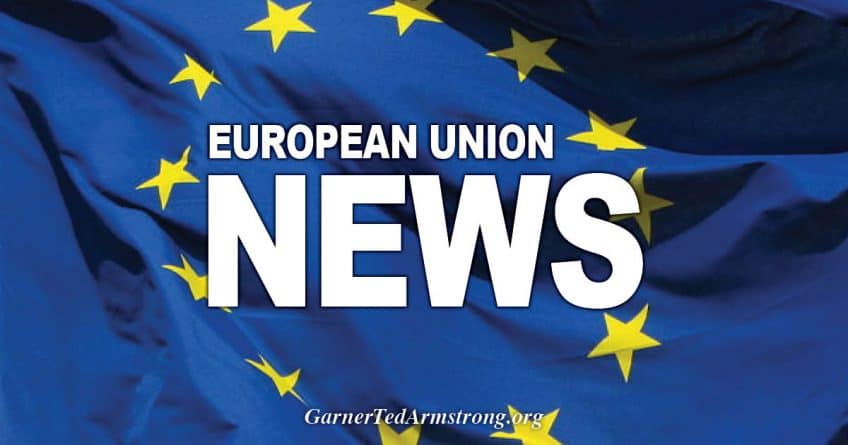
High Representative of the Union for Foreign Affairs and Security Policy/ Vice-President of the Commission Federica Mogherini (C-down) waits the start of the plenary session of the Informal meeting of defense ministers at the National Palace of Culture in Sofia, Bulgaria, 05 May 2018. Bulgaria took over its first Presidency of the European Council from January 2018 until June 2018. Photo: copyright profimedia.cz
The European Parliament reached an agreement on 22 May with the Bulgarian Council presidency on the €500-million European Defence Industrial Development Programme (EDIDP), known as the capability window, for the 2019-2020 period, mirroring Europe’s growing appetite for defence cooperation that includes building up of the defence industrial base. However, national interests continue to dominate defence industry.
Bids for the EDIDP funding will have to include at least three member states, three different entities located in the EU and the money can make up of up to 20% for prototype development and 100% for testing or design. PESCO projects and those including SMEs and middle-capitalisation companies will be eligible for more financial support. However, as defence and defence industries traditionally are areas exclusively governed by nation states, cooperation in this filed remains plagued by strong protectionist approaches. National governments remain focused on preserving autonomous industrial capacities. Such nationalist views persist in Europe despite proclaimed goals of building up a common strategic culture, shared capabilities and synchronised defence planning.
By integrating supply chains and building the defence industry into one organism, Europe can start to gradually change its overall strategic culture.
Similarly, defense companies benefit from the situation, in which individual countries support and subsidize domestic industries with the goal of keeping some degree of self-sufficiency in the supply of defense material – a position contradicting overall the overall philosophy of shared European strategic autonomy and defense cooperation. States alone do not possess economic, technological or industrial means to provide military equipment and systems for themselves. In such situation, the division of labor and a throughout integration of supply chains across all EU member states is critical. By integrating supply chains and building the defense industry into one organism, Europe can start to gradually change its overall strategic culture.
However, even with the minimum trilateral format and the support of SMEs mid-cap companies, the ambitious incentives of the EDIDP can go mainly to big defence companies and distort further the market. The situation favours mainly the most robust and advanced entities, located dominantly in Western Europe, and carry the risk that small post-Soviet industries will fail to secure equal help. Considering such a scenario, protectionist policy deployed by weaker defence industries – especially under growingly nationalist governments – are likely to ensue.
The East-West divide does trickle down into the defence industry. If Europe is serious about European defence, the first step in building a shared strategic culture is building a truly shared, integrated, inclusive industrial defence base that will benefit all member states.
While PESCO is decided by unanimity, the EDIDP will award money based on qualified majority voting (QMV), a set-up that could still favour Western countries. Normally, the QMV allots the UK, France and Germany leading roles that have the most influence over the final outcome. With the coming departure of the UK, a frequent partner for the Baltics, Visegrad as well as the Benelux, the power dynamic is shifting to Germany and France. The two are typically not completely aligned.
While the Germans call the shots in economic terms, the defence area is the one France dominates in. Berlin rejects to grow its defence spending to 2%, maintains an inadequately weak military and stresses inclusivity over ambition in PESCO. Defence integration has mainly political and integration value for Germany, which does not fear Russia but fears any negative impact to their export-based economic model inherently tied with the European market.
The sensitivity of these traditionally exclusive national domains uncovers the persistent domestic visions on many things.
Meanwhile, France has serious security concerns on the southern flank combined with another Transatlantic divergence. Due to its historical emphasis on autonomy, France enjoys military, constitutional and political conditions that allow it to deploy forces and act militarily in a resolute way – a unique position in the European Union. This translates into a dominant defense industry and French expectation and economic rationale that its military leadership in Europe will translate into economic benefits and a dominant role of its industry.
While tanks are not as easily exportable as cars, they do cost more, but not everyone can export tanks. The European Union has made significant strides in many fields recently, especially in the area of defence and security. But the sensitivity of these traditionally exclusive national domains uncovers the persistent domestic visions on many things. The question remains whether Europe is ready to overcome those. The geopolitical situation is a tempting opportunity.
Source: https://www.esjnews.com/european-defence-industry
[Disclaimer]








